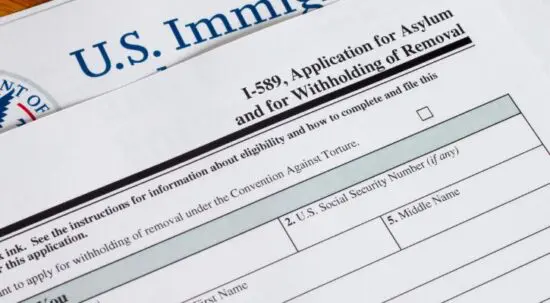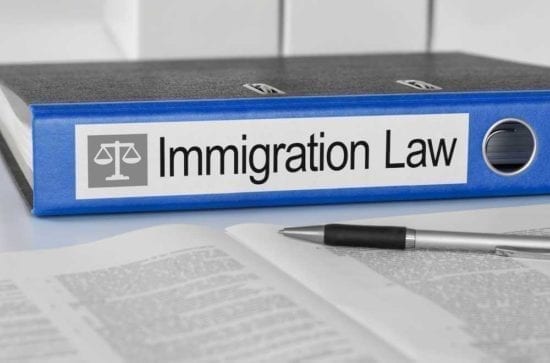What is immigration detention?
Immigration detention is when the U.S. government holds you while it reviews your case or prepares to deport you. You may be detained if you are caught crossing the border or arrested by ICE inside the U.S.
Detention centers are like jails. They are run by Immigration and Customs Enforcement (ICE), Customs and Border Protection (CBP), or sometimes by private companies, local governments, or the military. Each facility may have different standards.
- ICE facilities are long-term detention centers for people waiting for immigration hearings or deportation.
- CBP centers are short-term holding centers for people caught at or near the border. Officers process people before releasing, transferring, or deporting them.
Immigration detention has increased sharply in 2025, and conditions are worsening. Overcrowding, poor medical care, and abuse have been reported in multiple detention centers across the U.S.

Learn what to do if ICE comes to your home, job, or stops you in public. Understand your rights and how to make a safety plan.
What to do if you are detained
If you are taken by CBP or ICE, stay calm. For your safety, it is important to:
- Follow instructions
- Always keep your hands where the agent can see them
- Tell officers if you have children or medical needs
- Ask to call a trusted contact (memorize important phone numbers)
- Do not argue, struggle, or resist
- Do not tell lies or show false documents
- Do not sign any documents without speaking to a lawyer first
Your rights in detention
It is important to know your rights while in detention. Even though you have rights, they are not always respected and may be hard to use. You will need to speak up for yourself.
Legal rights
- Remain silent. You do not have to answer questions about your birthplace or immigration status.
- Refuse to sign any papers before speaking with a lawyer.
- Speak to a lawyer and have them present during conversations with immigration officials and at hearings. The U.S. government does not provide free lawyers, so you must find your own.
- Make a phone call to a family member, friend, or lawyer.
- Contact your consulate, which may help you find legal support.
If you fear returning to your country
- Request a credible fear interview if you fear returning to your country.
- If you are afraid to return to your home country, say “I am afraid to go back to my home country” as clearly and loudly as possible. Repeat it whenever you can.
- If you have a removal case in immigration court, argue your removal proceedings case in an immigration hearing before a judge. In that removal case, you may be able to apply for asylum if you are afraid to return home.
Options for release
- You can ask for a bond hearing. This means meeting with a judge to ask to be released while your case is still going on.
- You may be able to request “parole,” or release from detention.
- If you entered the USA without permission, your request for a bond hearing will be denied with rare exceptions.
- You may still be eligible for a bond even if an immigration judge says you are not. Talk to an immigration lawyer.
Basic protections
- Receive a copy of the detention center’s rules.
- Access medical care, including physical and mental health treatment.
- Be protected from physical or verbal abuse by officers.
- Not be treated poorly due to your race, ethnicity, religion, nationality, gender, sexual identity, or disability.
Note: A federal court told ICE it cannot automatically transfer unaccompanied children who are in government shelters to ICE detention when they turn 18 because it is against the law.

Learn how to prepare for court hearings if you are facing deportation.
What to expect in a detention center
Conditions and treatment in detention facilities can be very different based on where you are. There are official rules about how people should be treated, but many people report conditions that do not meet those standards. Here is what you can generally expect:
Arrival and communication
- Officers will take your fingerprints and photograph.
- Your belongings, including your phone and documents, will be taken. The government is supposed to return them to you when they release you.
- You should be assigned a deportation officer who will handle your case.
- You may receive a Notice to Appear, which explains why the U.S. wants to deport you and starts your immigration court case.
- Access to phones is limited. You can make outgoing calls, which may be monitored, but you cannot receive calls. Some facilities require you to pay for calls.
- Mail can be sent and received, but may be inspected.
Visits and legal support
- Family visits should be allowed at certain times, either in person or through a glass barrier.
- Lawyers can visit at any time during visitation hours.
- You should have access to a law library and a list of free legal services.
- Detention may last days, months, or longer.
- You may be moved to another center without warning, which can be far from your family and lawyer, sometimes in a different state. Many centers are in remote areas, which makes it harder to visit.
Daily life and care
- You may be held in a shared dormitory, an individual cell, or a crowded space.
- Men and women are usually housed separately.
- Some families may stay together, but parents should ask officers where their children are taken. Children may be transferred to ORR custody, which places them in shelters, group homes, foster care, or with carefully vetted relatives. Family detention centers may have different standards.
- Children may stay in detention longer and live in unsafe or unhealthy conditions.
- Officers conduct roll calls throughout the day to check that everyone is present.
- You will have limited freedom of movement and will not be allowed to leave the facility.
- The facility should provide basic necessities, such as clothing, bedding, toiletries, water, and meals. You should have access to showers. However, many people report not having enough food, clean water, beds, soap, or working showers.
- Some facilities have been described as “inhumane”, with spoiled food, undrinkable water, or lights left on all day and night.
- Some people are placed in solitary confinement, sometimes as punishment or after raising complaints.
- Medical care should be available, but it may be limited or delayed.
To learn more about a specific detention center, search the ICE detention facility directory.
This information can be hard to read, especially if you or someone you love is at risk of detention. You have rights and deserve to be treated with dignity. If those rights are not respected, the next sections explain how to report violations and where to find help.
Report problems or violations
There have been cases of human rights abuse and poor conditions. If you experience this, you can file a complaint through:
- National Immigration Detention Hotline – Dial 9233# from facility phone
- ICE Detention Reporting and Information Line – Dial 9116# from facility phone
- Your Deportation Officer or ICE Field Office Director
You can also ask your lawyer or local non-profit for help with filing the complaint. Make sure to write down details like when and where it happened and the names of anyone involved. In most cases, you can file anonymously and do not have to give your name.

If you are at risk of being detained, seek legal advice from an immigration lawyer or accredited representative. Some offer free or low-cost legal services.
Find help
If you or a family member is in detention, you can find help with:
Who | Offers | Contact |
Free membership with legal help | info@asylumadvocacy.org | |
Get updates about your case and upcoming court dates using your A number | 800-898-7180 | |
Find an immigration court | ||
Report problems in detention | 888-351-4024 9116# from facility phone | |
Find where a family member is detained | ||
Free immigration legal information in your language | 2150# from facility phone | |
Search for legal help by detention facility | ||
Help with paying immigration bond | ||
Find family, resources, and report abuse | 209-757-3733 9233# from facility phone | |
Help for those sexually assaulted in a detention facility or elsewhere | 800-656-4673 | |
Help if separated from a child or family | 800-203-7001 699# from facility phone | |
Find organizations that help people detained in Texas | ||
Help for refugees and asylum-seekers detained in the U.S | 202-461-2356 #566 from facility phone |
If you are trying to seek help while detained, have the following information ready to share if you have access to a phone:
- Your full name
- Alien Number (assigned to you after immigration officers process you)
- Date of birth
- Country of birth
- What city you are located in
- Whether you are detained by ICE or CBP, if you know
An officer at the detention center can tell you where to find your Alien Number, what city you are in, and if ICE or CBP runs the detention center. All this information is helpful for your loved ones or legal counsel to locate you.
Learn how to find a loved one in detention.
Next steps after release
- Keep copies of all papers ICE gives you and follow any instructions carefully.
- You may still be monitored and required to frequently check in with ICE.
- Make sure to attend all immigration court hearings.
More from USAHello
Looking for specific information?
The information on this page comes from CLINIC and other trusted sources. We aim to offer easy to understand information that is updated regularly. This information is not legal advice.




